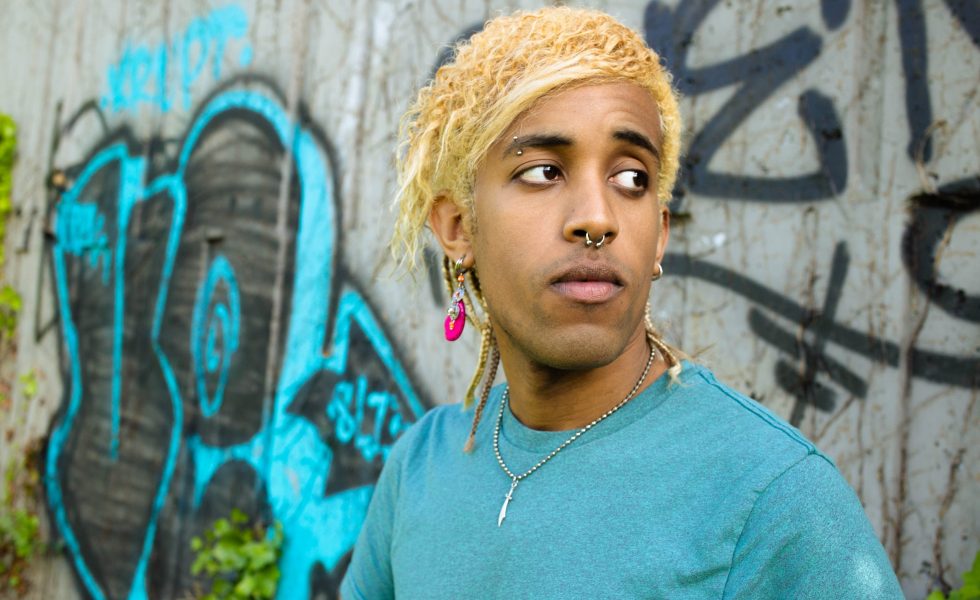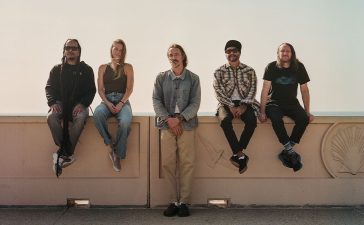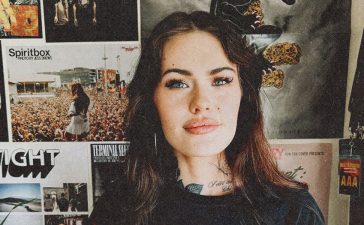Imagine being raised in a household where music wasn’t just absent, but forbidden altogether. It’s a harrowing prospect no doubt, but for Seattle-based goth-punk debonair Danny Denial, such was his childhood reality. It was only at age eight that he discovered music as an art form via television, when MTV ran the infamous clip for Blink-182’s seminal pop-punk classic ‘What’s My Age Again?’ – if we may say so ourselves, the definitive way one can be introduced to the concept.
Thus began a decade-spanning sprawl of sonic exploration, Danny working backwards from his ’90s pop-punk induction to study the art of music in secrecy. “Throughout my teen years, I got really big into ‘90s alternative music,” he explains, “But then I went back and explored a lot of ‘80s new wave, then ‘70s punk stuff. It became this backwards journey through the history of music where, by the time I was in college, I had finally caught myself up.”
Unlike most of us – and the overwhelming majority of Danny’s musical peers – not having music be an integral part of his upbringing meant Danny felt an initial burden of guilt in expressing himself as an artist. “I never really thought I would ever have the license to do it myself,” he admits. “I just knew that I loved music a lot – I was very obsessive with music from the moment I discovered it, but I spent ten years solely as a listener before I ever had the thought that I could do it myself.”
Such is not to imply that Danny never felt an artistic itch; his early endeavours in beatmaking were literally made in the closet, vocals whispered into an old mobile phone (this was in the era pre-smartphone, too, so we’re talking truly dogshit mic quality and kilobit-sized files) and spun through a bootlegged Cakewalk knockoff for Windows XP. Danny made his first tunes purely for self-gratification – then deleted them, lest the files wound up in anyone else’s hands.
“I didn’t allow myself to claim being a musician or an artist,” Danny says. “I just felt like it wasn’t my lane to live in. Instead I thought, ‘Well, I’ll just make films, and music will be a big part of them’ – and that became what I’d try to explore in college. But eventually, when I hit my 20s, I went through a period where I started teaching myself how to play the guitar and do more with my songwriting. And then right before I moved to Seattle, I just kind of came out of the closet with my music and put a bedroom EP on the internet, and I never looked back from that point.”
It’s 2015 when Danny drops I Can’t Wait To Dye: three angular and brutish emo-pop cuts strewn in silky pugnacity and scalding teen angst. They’re messy, rough, and a little jarring to boot – low-fi exercises in dagwood-sandwich Logic files where Danny spurs off dread-soaked quips with a self-assured pseudo-country swagger, thrashing drum samples and wailing feedback belting calamitously behind him. The motherfucker outright induces a panic attack in this scribe when its title track climaxes in a breathless flurry of sirens, screams and shredding.
Gracelessness aside, Danny’s first release is fantastic – moreso than all the other adjectives we’ve used to paint it, ‘honest’ is the EP’s most apt descriptor. And that honesty would only be amplified on subsequent offerings: as Danny came into his own as a black, queer, leftist millennial in a world that is still sourly (and unashamedly) cold towards people that fit any of those three criteria, he became more and more confident in letting his artistry reflect his identity – and vice versa.
Nowhere is this more prevalent than on his career-defining 2020 album, Fuck Danny Denial. We start with the one-two punch of ‘Mercer Summit Block Party / Brand New Skirt’ and ‘Am I Cool Enough For Your Love’, the former a glittery pop gem that gently unfurls into an ashy crawl as Danny’s mania twists into a dysphoria-driven lull, and the latter a simmering, psychedelic ballad seeped in uncertainty and self-deprecation. As bewitching and relatable as both tracks are, they’re direct snapshots of where Danny was in his life at the time of their inception.
“I actually wrote ‘Mercer Summit Block Party’ at this festival in Seattle called the Mercer Summit Block Party in 2018, so I can quite literally say that was the day I started writing the album,” he chuckles. “For a lot of my solo work, I’m more or less just taking my own thoughts and experiences and turning them into what I guess a novelist would with a memoir, or a filmmaker would with a screenplay based on their own life.
“And I did it in realtime with this album. When I wrote those first two songs, I didn’t know where the album was going, sonically. I had no idea it was going to be this genre-bending rollercoaster concept record that charted all these highs and lows – I was still kind of on the high, and it was only when I got midway through and I was writing the last few songs on the record that I realised, ‘Oh, okay, this is an album! This is going to be a thing!’”
“People can misconstrue my message and twist my words, obviously – I think we’re seeing a lot of it now with voices from people who look like me.”
At the core of Fuck Danny Denial – and its auteur’s musical output at large – is a blinding frustration. Danny is black and queer, stumbling through a society that wants to clip him at the ankles with every step. He’s progressive and empathetic, while the world around him is callous and corrupt. Politics bleed naturally into his songwriting because especially in the present day, Danny’s existence – and refusal to sheathe any part of it, lest he upset an oppressor – is a political statement. As recent years have seen him grow more confident in his artistry, music has become a tool for Danny to reckon with his feelings of displacement.
Danny explains, “I like having the music serve as a document of my own thoughts and feelings and opinions that can’t be misconstrued or twisted – I think it’s liberating in that way. For example, recording the song ‘White Tears Fake Queers’ was cathartic, and then having it out there as a statement of my stance on the things that I was singing about, that feels empowering. I could disappear tomorrow, and [the track] would still be out there, y’know? It feels like being able to reclaim one’s own agency at times, to have a declaration or documentation of whatever the fuck you want to declare or document.
“People can misconstrue my message and twist my words, obviously – I think we’re seeing a lot of it now with voices from people who look like me. People can take [the art] and do what they want with it, position it or contextualise it however they want to – but I just have to remind myself that that has nothing to do with me. At the end of the day, I know what I’m saying with my own music, and that relationship between myself and my work is still liberating, regardless of whatever people choose to do with it.”
The public reception to ‘White Tears Fake Queers’ was expectedly mixed; it was praised by people of colour and members of the queer community that identified with Danny’s equally barbed and buoyant fury – but, in what should come as a shock to literally no one, the track was derided by cishet white people who (ironically) felt slighted by the cut’s lyrical themes.
Comments flooded Danny’s inbox: “Oh, this is just degrading”. “You’re just leaning into identity politics for attention”. “I miss when music was about music, not leftism and virtue signalling”. It’s reminiscent of the way jaded, balding white men will attack Tom Morello on Twitter for posting about racial injustice, as though Rage Against The Machine hasn’t been loudly and opaquely leftist since its late-’80s inception.
But that’s one narrative thread Danny is quick to leap on: “You can get away with a lot if you’re just a little bit selective and vague enough,” he notes. “I’ve had messages like that before where people would say things along the lines of, ‘I really liked your music before, but then you made it too political and started pandering.’ But it’s like… No. It’s coming from the exact same place, I’m just being less vague about it. I’m less afraid of stepping on toes now.”
“It’s easy to say, ‘Fuck you, blank,’ because you can fill in the blank with whatever you want – your parents, your job, your city, whatever – but when you explicitly say, ‘Fuck you, systemic racism,’ you get a lot of people going, ‘Well, I don’t relate to that.’ And it’s ridiculous, because you don’t need to relate to it. I look at myself as a listener and I think about people who are going through their own specific experiences – like Against Me!’s album Transgender Dysphoria Blues: that record hits me so intensely, but I’m not a trans person. I don’t experience the gender dysphoria that Laura Jane Grace experiences on that record, but her rage and displacement is so palpable that I don’t need to have that exact reference point.”
Danny sums it up better than we ever could: “Rage is rage, expression is expression and catharsis is catharsis. We’re all just containers. You can relate to the rawness – the emotional accessibility of someone just putting their heart out to you – without sharing their perspective. And I think when people are less afraid of being vague, and are bold enough to be as explicit and direct as, for example, Against Me! was on [Transgender Dysphoria Blues], the listeners can learn a lot. I know I learned a lot! I feel like people need to be more open-minded about the lived experiences of people who aren’t in their own little bubbles.”






